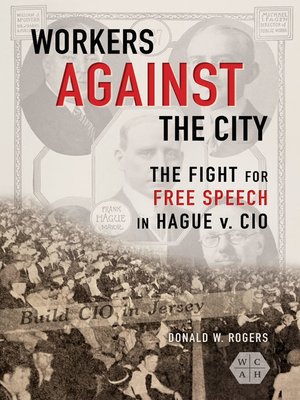Workers against the City
ebook ∣ The Fight for Free Speech in Hague v. CIO · Working Class in American History
By Donald W. Rogers

Sign up to save your library
With an OverDrive account, you can save your favorite libraries for at-a-glance information about availability. Find out more about OverDrive accounts.
Find this title in Libby, the library reading app by OverDrive.



Search for a digital library with this title
Title found at these libraries:
| Library Name | Distance |
|---|---|
| Loading... |
The 1939 Supreme Court decision Hague v. CIO was a constitutional milestone that strengthened the right of Americans, including labor organizers, to assemble and speak in public places. Donald W. Rogers eschews the prevailing view of the case as a morality play pitting Jersey City, New Jersey, political boss Frank Hague against the Committee for Industrial Organization (CIO) and allied civil libertarian groups. Instead, he draws on a wide range of archives and evidence to re-evaluate Hague v. CIO from the ground up. Rogers's review of the case from district court to the Supreme Court illuminates the trial proceedings and provides perspectives from both sides. As he shows, the economic, political, and legal restructuring of the 1930s refined constitutional rights as much as the court case did. The final decision also revealed that assembly and speech rights change according to how judges and lawmakers act within the circumstances of a given moment.
Clear-eyed and comprehensive, Workers against the City revises the view of a milestone case that continues to impact Americans' constitutional rights today.|List of Illustrations
Acknowledgments
Introduction
Chapter 1. The Rise of Boss Hague: Municipal Politics and Civil Liberties in the Old Era
Chapter 2. The Transformation of Labor Unionism in a Boss-Run Town
Chapter 3. Street Fight and Media Fight in the Battle for Jersey City
Chapter 4. Into Federal District Court: Municipal Power and Civil Liberties in a New Forum
Chapter 5. "Time Out of Mind": The Supreme Court Decision(s)
Epilogue: Aftermath and Legacy
Notes
Bibliography
Index|"Workers against the City is an excellent, nuanced, and timely history of Hague and the fight for free speech. . . . His careful analysis of free speech and civil liberties before the era of FDR is appropriately grounded in the Reconstruction and World War I periods." —Labor
"Workers against the City brings a fresh perspective to one of the more famous free speech and assembly battles of the turbulent 1930s, which was the newly emerging Committee of Industrial Organizations' and American Civil Liberties Union's clash with the Jersey City, New Jersey, machine led by Major Frank Hauge." —Journal of American History
"Rogers set out to write a book about Hague v. CIO, and the book accomplishes this task admiringly. That it points to other areas worth exploring underlines its strengths, not it weaknesses." —NJS
|Donald W. Rogers is a lecturer in the department of history at Central Connecticut State University. He is the author of Making Capitalism Safe: Work Safety and Health Regulation in America, 1880-1940 and editor of Voting and the Spirit of American Democracy: Essays on the History of Voting and Voting Rights in America.
Clear-eyed and comprehensive, Workers against the City revises the view of a milestone case that continues to impact Americans' constitutional rights today.|List of Illustrations
Acknowledgments
Introduction
Chapter 1. The Rise of Boss Hague: Municipal Politics and Civil Liberties in the Old Era
Chapter 2. The Transformation of Labor Unionism in a Boss-Run Town
Chapter 3. Street Fight and Media Fight in the Battle for Jersey City
Chapter 4. Into Federal District Court: Municipal Power and Civil Liberties in a New Forum
Chapter 5. "Time Out of Mind": The Supreme Court Decision(s)
Epilogue: Aftermath and Legacy
Notes
Bibliography
Index|"Workers against the City is an excellent, nuanced, and timely history of Hague and the fight for free speech. . . . His careful analysis of free speech and civil liberties before the era of FDR is appropriately grounded in the Reconstruction and World War I periods." —Labor
"Workers against the City brings a fresh perspective to one of the more famous free speech and assembly battles of the turbulent 1930s, which was the newly emerging Committee of Industrial Organizations' and American Civil Liberties Union's clash with the Jersey City, New Jersey, machine led by Major Frank Hauge." —Journal of American History
"Rogers set out to write a book about Hague v. CIO, and the book accomplishes this task admiringly. That it points to other areas worth exploring underlines its strengths, not it weaknesses." —NJS
|Donald W. Rogers is a lecturer in the department of history at Central Connecticut State University. He is the author of Making Capitalism Safe: Work Safety and Health Regulation in America, 1880-1940 and editor of Voting and the Spirit of American Democracy: Essays on the History of Voting and Voting Rights in America.







